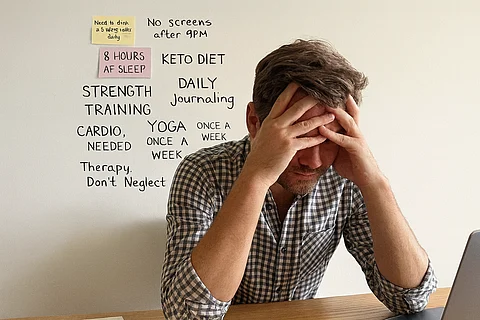
- HOME
- TRENDING
- PEOPLE
- COMMUNITY
- LIFESTYLE
- OUR PUBLICATIONSOUR PUBLICATIONS
- MASALA RECOMMENDS
- MASALAWEDS

“When it comes to health, you want to aim for good, not perfect,” said Dr Mike, a board-certified family medicine physician and popular health educator, on The Diary of a CEO podcast, hosted by entrepreneur and author Steven Bartlett. He adds that the more you chase perfection, the more you invite a negative response.
This is because every health decision involves a trade-off. We often feel that if we’re not pushing our bodies to reach the level of what we call ‘perfect health’, we’re falling behind. This feeling is often evoked by the health misconceptions we receive from social media. The truth is that what our body really needs is “balance”. This involves sustainable and tailored actions, plus being mindful of trade-offs.
When health becomes a rigid checklist, it breeds anxiety, guilt, and fear of imperfection. These negative responses that we experience are toxic to the body.
Imagine you’re craving ice cream, but a voice in your head starts stressing over how much sugar and dairy it has, and you begin counting every calorie. At the same time, you genuinely want it, yet you deprive yourself out of fear. In the end, which leaves a deeper impact on your health, the sugar in the ice cream or the cortisol surge from telling yourself you can’t have it?
A balanced approach would be, rather than avoiding it completely, to enjoy the treat in moderation, making sure it doesn’t turn into overindulgence.
Our social media feeds are packed with health tips and confusion. A flashy video might push a trendy oil. Another tells you to quit sugar forever.
Dr Mike warns that people posting health information online often treat early studies, sometimes done on mice or in petri dishes, as the final truth. He adds that what works in a lab doesn’t always work in real life. This creates an environment where certainty is sold in an uncertain world, leading to more noise than truth.
On the other hand, even if the advice is factually correct, generalised information doesn’t work for everyone. Our bodies are unique, and each person's health needs are different. This means what works for one person can fail or even harm another. Health isn’t viral; it's personal.
When it comes to health, perfection is an illusion. The perfect diet, the perfect workout, and the perfect supplement stack can become a trap, where chasing perfection leads to burnout instead of wellness. This is because people often fall into the “all-or-nothing” thinking: either they follow their routine flawlessly or feel they’ve failed.
Many of us set endless health rules for ourselves, believing we must follow them to achieve perfect health. Eight hours of sleep. Two and a half litres of water a day. Three yoga sessions a week. The perfect balance of cardio and strength training. Every meal is packed with the right amount of protein, fibre, and micronutrients, counting calories, avoiding screens before bed, and sticking to an endless list of wellness “rules”.
What happens is, over time, this constant self-monitoring becomes exhausting. The sheer volume of tasks and information turns health into a full-time job, creating overwhelm, burnout, and, ironically, more stress, the very thing that harms health in the first place. In short, striving for perfect health can result in poor mental health and very little joy.
We have been told that we need to drink lots of water or eat lots of fibre to be healthy. While water is essential, overhydration can disrupt electrolytes and harm your brain. Even nutritious foods like carrots can turn your skin orange when consumed in excess.
Medicines and supplements work the same way. Labelling them as purely harmful or beneficial is misleading. That’s because the human body works in homeostasis, which is a natural state of balance. Push too far in any direction, and you disrupt that balance, creating problems instead of solving them. We all probably know that one person who did everything “by the book”, ate the healthiest food, and still faced serious health issues. After doing everything right, they often wonder how or why they got sick. On the flip side, we’ve also seen people who ignored their health for years and later faced the consequences.
When it comes to health, there is no one-size-fits-all answer. A balanced lifestyle looks at both benefits and risks. Social media loves extremes, but health lives in the grey. It’s not good vs. bad; it’s balance.
The key to a long life doesn’t mean skipping dessert. The world’s longest-living people didn’t chase fad diets or strict food rules. Jeanne Calment, a French woman who lived to be 122 years old, ate two lbs of chocolate per week, enjoyed occasional glasses of wine and loved olive oil. She preferred tastier foods over bland options, yet she also believed in staying active. She rode a bicycle until she was 100, lived in the moment, and had a good sense of humour.
My grandparents didn’t count calories or steps, and they lived to 90. They ate white rice regularly, enjoyed soft drinks occasionally, and had home-cooked meals like roti, vegetables, and curries.
Real health doesn’t come from extremes. It comes from balance. Eating well should nourish you, not stress you out. Moving your body should lift your mood, not punish you. Choose health that fits into life, not takes over it.
Perfect health might look good online, but it rarely works in real life. The more we chase it, the more we stress out. But when we aim for “good enough”, we actually build habits that last. The healthiest people aren’t those who chase perfection but those who find a sustainable middle ground that fits their lives. They don’t overdo it. They don’t guilt themselves. They do what works, and they let go of the rest.